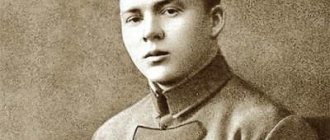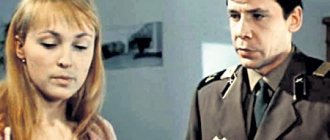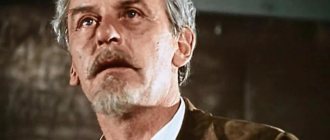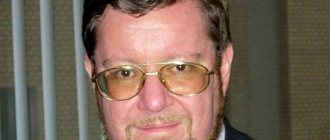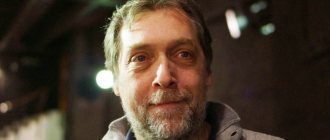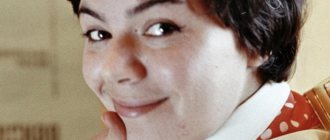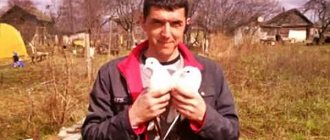Curriculum Vitae
The biography of Arkady Arkanov is a typical story of a talented boy from a strong Jewish family. Dad Mikhail Iosifovich is a supply specialist, mother Olga Semyonovna is a housewife. Arkady was born on June 7, 1933 in Kyiv. He graduated from school with a gold medal and became a doctor after graduating from the First Moscow Medical Institute. I always loved music and had a literary gift. The Steinbock family (real name of Arkady Arkanov) had to endure the arrest and imprisonment of Mikhail Iosifovich in 1934, evacuation to Siberia during the war, post-war hunger and cold.
But despite the hardships and difficulties of that time, Arkady Mikhailovich considered his childhood happy, warmly remembering his native Kyiv, snowy Krasnoyarsk, his Moscow courtyard and his classmates at the institute. Arkady Arkanov felt his love for literature and art while still in medical school. He actively took part in local skits and was a member of the “Medical Theater and Variety Group.” Here Arkanov met with Grigory Gorin, a creative union with whom turned out to be life-long. Therefore, it is not surprising that, having worked as a doctor for the required three years after graduation, Arkady Arkanov said goodbye to medicine and devoted himself entirely to literary creativity.
Music
Arkady Arkanov is the author of a number of lyrics of famous songs. In 1965, in collaboration with Grigory Gorin and composer Konstantin Pevzner, the “Orange Song” was written for the 8-year-old Georgian performer Irma Sokhadze. Subsequently, this popular song was in the repertoire of many performers, including Marina Vladi and her sisters, Anastasia Stotskaya and others[23][24].
Together with Levon Oganezov, he came up with and implemented the musical project “Educational Education for Pop” (classical literary works remade in the style of popular songs)[25]. Classic works were chosen for popularization through “pop”: “The Idiot” (according to F. M. Dostoevsky)[26], “Anna Karenina” (according to L. N. Tolstoy)[27], “The Queen of Spades”[28] and “Eugene Onegin”[29] (based on A.S. Pushkin and P.I. Tchaikovsky), “Faust” (based on Goethe)[30], “Romeo and Juliet”[31] and “Othello”[32] (based on Shakespeare). In some cases, the style of a particular performer was taken as the basis for the parody - for example, according to the author’s notes, “Faust” was supposed to be performed “sweepingly, gastronomically, with horse stomping and shouts of “hurray””; “Queen of Spades” is “girlish, Aleno-Apin-style,” and “Idiot” is “principally, shufutinist.”
As a result of a creative duet with composer Igor Krutoy, songs such as “Big Hello”, “Waltz”, “Honduras” (duet performance by Arkady Arkanov with Lolita Milyavskaya[33], later with Laima Vaikule), “God Bless You”, “Girl” appeared. named I Want” (Spanish Irina Allegrova)[34], “Hole in the Head” (“Song of the Motherland”) (Spanish Alexander Buinov)[35], “Tender Maya”, “Madame”, “My 20th Century” (Spanish Valery Leontyev[36], later Mark Tishman[37]), “Pur-mur-mur”, “There is grass in the yard”, “We need to be closer friends with animals”, “Time Train” (duet performance by Arkady Arkanov with Igor Krutoy), “My Thoughts”, “Tango”, “Titicaca”, “Tulip”, “The priest had a dog”, “Youth is leaving”, “Crystal and champagne” (Spanish Alexander Buinov). In 1995, the disc “Krutoy Arkanov - Arkanov Krutoy” was released[38]
In 2009, he took part in the recording of Alexander Gradsky’s rock opera “The Master and Margarita” (the role of Editor)[39].
Arkanov - writer and playwright
The creative biography of Arkady Arkanov developed successfully. His first collection of short stories, “Four Under One Cover” (1966), brought him fame. In addition to him, the book published stories by Gorin, Kandel and Uspensky. Arkady Mikhailovich actively published in the then popular Literary Newspaper and the magazine Yunost.
In 1968, humorist Arkady Arkanov was admitted to the USSR Writers' Union, which meant recognition of the official status of a writer. By that time, Arkanov was already quite famous and loved by readers. The writer gained even greater popularity after the publication of the illegal almanac Metropol, in which he took part in the company of the iconic Vysotsky, Akhmadulina, and Voznesensky. The books of Arkady Arkanov are still relevant and have long been sorted into quotes.
In addition to sparkling humorous stories, sketches and miniatures, Arkady Arkanov, in collaboration with his friend Grigory Gorin, made his contribution to great drama. From the pen of the authors came the plays “Banquet”, “Wedding for the Whole of Europe”, “Little Comedies of a Big House”. The plays were loved by directors, actors and audiences. For example, stars such as Andrei Mironov, Alexander Shirvindt, and Tatyana Peltzer played in “Little Comedies.”
Medical question
He thought for a long time about where to go after graduating from high school, and after consulting with his parents, he submitted documents to the First Moscow Medical Institute named after I.M. Sechenov, who graduated in 1957. Medicine was a conscious choice, since Arkady became interested in Pavlov’s teachings while still at school. At the institute, my favorite subject was anatomy and any disciplines that are inextricably linked with physiology. But biochemistry and pharmacology did not inspire much zeal in my studies. He studied at the Faculty of Medicine, at that time the medical institute had only two faculties - sanitary-hygienic and medical, and general doctors were trained. And the direction was chosen only after graduate school or residency. Arkady studied without choosing anything special. At one time I wanted to become a surgeon. But having found himself in a “boiling” creative atmosphere at the institute, he began to realize that he would not be able to work as a doctor all his life. And, as he believed, it is categorically impossible to share the profession of a doctor with anything else; one must devote oneself completely to it, because the doctor is responsible for the health and fate of a large number of people. Although, after graduating from university, it took three years to implement this “combination”, since it was necessary to work off the funds spent by the state on his studies. Arkady understood this and conscientiously, devoting himself completely to the medical profession, worked as a local therapist and pediatrician, after which he left medicine.
He was lucky at the institute; there were always talented people next to him, both scientifically and creatively. Studying was combined with creative meetings, musical evenings, skits that they themselves invented, wrote and played themselves. All this has transformed from fun and pleasant pastime into a concept somewhat broader than a hobby. Student creative “get-togethers” brought him together with Grigory Gorin, and for 10 long years they became co-authors, jointly composing both pop works and large plays: 1966 - “Wedding for the whole of Europe”, 1967 - “Staircase”, 1968 - “Was there Dumas the Father?”, 1969 - “Banquet” and a number of others.
Arkanov on stage
Arkady Arkanov's texts were read from the stage by many professional pop artists. Viewers of the older generation remember Vladimir Vinokur’s funny one-man show “I Go Out Alone.” Evgeny Petrosyan spoke with a story from Arkanov’s series “Dreams of Ivan Stepanovich.” The legendary “Red Pashechka” performed by the permanent host of the “Around Laughter” program, Alexander Ivanov, gained enormous popularity.
By the way, the program “Around Laughter” was the first to provide a stage for the authors of humorous works themselves. The experiment turned out to be successful. The audience warmly received Gorin, Koklyushkin, Smolin, Zhvanetsky and, of course, Arkanov. Since then, Arkady Arkanov’s biography has included numerous tours throughout the country with an original program and creative evenings.
Arkady Mikhailovich is also known as the author of the lyrics of many songs by popular pop singers.
Career as a satirist and TV presenter
As a satirist, Arkady Arkanov began with monologues, parodies, and sketches. He himself has said more than once that writing is much more dear to him, but the royalties from books do not allow him to live comfortably, so he gratefully accepts offers to perform in halls and on television.
Arkanov wrote monologues not only for himself, but also for his colleagues: Evgeny Petrosyan performed one of the writer’s stories, and for Vladimir Vinokur he wrote a one-man show “I Go Out Alone.” At the same time, the satirist spoke unflatteringly about the program “Full House” and similar ones, equating the stage with low-grade Americanized humor that hits below the belt.
Arkady Arkanov and Mikhail Zhvanetsky | MetroNews
For comparison, Arkady Arkanov spoke with great warmth about Mikhail Zhvanetsky, gladly took part in meetings of the White Parrot club, hosted the program “Around Laughter”, numerous author’s evenings and concerts at the Variety Theater.
Arkanov's most famous speeches are forever included in the golden fund of Russian satire. Among them are monologues and humoresques “Summary of the series”, “Calling Father to School”, “There are still good people” and dozens of other talented, sparkling things.
Arkanov and television
Arkady Mikhailovich Arkanov has always been a welcome guest on television. He acted as a TV show host and guest on various programs. So, Arkanov hosted “Around laughter. Non-stop,” co-hosted the popular program “White Parrot” together with Yuri Nikulin.
He was willingly invited to the jury of KVN and various author's programs. Arkanov also played in several films and documentaries. Keeping up with the times, Arkady Mikhailovich even starred in a video with Lolita Milyavskaya for his famous song “Honduras”.
Suitable company
In addition to success in creativity, Arkanov was very successful in love and friendship. This was his merit. Friends called Arkady Mikhailovich the last gentleman. He was sensitive to real male friendship and knew how to be friends himself. Everyone knows his tender attitude towards Grigory Gorin. They remained faithful to their long-term friendship all their lives, until Gorin’s sudden death in 2000.
Arkanov had a close relationship with Alexander Shirvindt. Their friendship was overgrown with many funny and witty stories, which they themselves gladly told. For example, about how they quarreled after betting on the wrong horse at the racetrack. Or how a funny sign was stolen from the desk of the floor attendant in an Odessa hotel, stating that a bed not paid for before 12 o’clock is considered free. Or how the management of the hippodrome, having calculated the total loss of two regulars, installed a memorial plaque with the names of Arkanov and Shirvindt on the newly built stable.
Arkady Arkanov communicated closely with many famous people. These are writer Arkady Inin, poet Mikhail Vishnevsky, satirist Semyon Altov, director Yuli Gusman, actor Yuri Nikulin. Friends always noted the brilliant wit and genuine nobility of Arkady Arkanov.
“On the Stone Bridge”: a touching story by the son of Arkady Arkanov
For the last eighteen years we have been living on different continents. It’s day for him, it’s night for me. My sunset is his sunrise. And vice versa. I don’t know his new friends, what kind of cigarettes he smokes now, or which drawer of his desk contains my photographs.
I don't even know if he has a desk. (The one that was there before, massive, littered with papers, with a deep red ashtray full of cigarette butts, with a curly-haired rag sailor who was always grinning in his beard, died, it seems, in one of the moves, and the computer can stand on anything.) But The emails that usually come from him when we have evening news, I understand that he goes to bed in the morning.
I'm used to not knowing anything about him. Before we were separated by oceans, we were eight floors apart. He lived on the second, my mother and I lived on the tenth. He had a one-room apartment with a cream-colored kitchen and windows into the courtyard. We have a two-room apartment with built-in shelving in the hallway.
I didn’t think about why this was until one of my school friends (Ponik, I think) enlightened me that my parents were divorced. It seemed completely absurd: dad practically lived with us. He met me from school, fed me lunch, sat with me over the copybooks (I clearly remember my hysteria from the inability to repeat the perfect letter of the sample and how my dad calmly raised his pens scattered throughout the room), sent me for a walk, waited for my mother to come home from work, discussed business with her, we had dinner together, then he left. The exchange of our large and beautiful three-room apartment on the fifth floor of the same building (in the elevator my hand poked at the “5” button for a long time, especially since it was convenient to press, but I had to reach for “10”) was explained to me by the need to create conditions for my dad to work. Dad is a writer. But a writer needs peace and quiet. And then, he smokes, and I am allergic to tobacco smoke. This has nothing to do with divorce.
Strictly speaking, the parents were officially married for only ten years. But this is if you don’t count the first four, when they didn’t sign. And the next twenty, without a name, during which they lived separately, stubbornly proving to each other that it was better this way, although in fact...
However, what can I know about this? The details of their divorce hardly matter. The details were usually communicated to my mother by telephone from countless well-wishers. Mom listened calmly, sometimes even laughing, then carefully lowered the receiver onto the lever and walked out to the balcony with a cigarette. Later, dad repeated to me many times that all the other women in his life were an accident, that he loved and loves only his mother, and that she always reacts inappropriately to everything. He seemed genuinely unable to understand how such nonsense could hurt. They wouldn’t have hurt me if my mother’s words that it was all over between them were true. In reality, she never really managed to stop loving her father. She never married again and, no matter how much she pushed him away, denied him, or erased him from her life, until the very end she remained a slave to her unhappy, unlived, unlivable love.
As a child, I often tried to imagine how they met... Mom screamed at him so loudly, banged the dishes so loudly, ran out of the kitchen so quickly that I could imagine them kissing or cuddling each other in the dark of the cinema, or even just walking down the street by the hand, it was not easy.
His slowness (which was transmitted to me in full) was praised and ridiculed by all who knew him in his youth. He did not lose it over the years, he simply balanced it slightly with the burden of the passing years.
The morning cup of coffee could last until lunch, taking out a handkerchief turned into a sacrament; in the interval between him striking a match and lighting a cigarette, mom had time to wash the floors, cook soup, run for bread and set the table. During the time he brought the cigarette to his mouth, tomorrow came. He shaved slowly, read the newspaper slowly, ate slowly. And he just sneezed quickly and a lot at once (thirty to forty times in a row), accompanying each sneeze with annoying shouts like “What’s wrong!”, or “Well, as much as possible!”, or a sing-song and savory “Y-o-o-b yours!” mother!" His mantra, mantra, and main parting word for me can be considered the words “Never run after a trolleybus,” which I, however, began to follow only when I found myself in New York, and even then not out of inner conviction, but solely due to the absence of this type on the streets transport.
My father’s image arose long before this word appeared in the Russian language. He always wore a tie, a jacket and a very special expression on his face, which some called absent, others - gloomy, others - concentrated. In fact, this expression was a family trait: already in America I discovered it on the always frowning face of my grandmother. (She herself was convinced that she radiated fun and cheerfulness, and could not understand why some person in the supermarket addressed her with the words Smile, you live in America.). The same expression is increasingly looking at me from the mirror, although without a mirror I, like my grandmother, seem to myself completely different: cheerful, cheeky, with a mischievous sparkle in my eyes. The trick is that my father learned to pass off his face as a mask, while with my grandmother, the mask imperceptibly turned into a face.
Part of his image was the way he read his stories: without emphasizing reprises, without smiling, patiently waiting out bursts of laughter. Someone (perhaps himself) explained this by saying that satirists need gloominess in order to accumulate the energy of humor. My father hated being called a satirist, but this formula suited him perfectly. He rarely laughed at home either. At best, he nodded and stated dryly: “Funny.” At worst, he simply nodded.
Mom usually laughed. Her laughter was so sincere and infectious that everyone around her began to laugh. In this sense, they could be an ideal couple: a laugher and a laugher.
I just want to interrupt the session, rewind the film and start it again. From the place where he comes out, slamming the door, and she runs out after him and throws the money he left at his feet. From the place where we all have no time for laughter.
It's hard to piss him off. I know this for sure, because I tried it more than once. Although now it’s much easier than before: it’s enough to complain about life, about how nothing works out, how everything is in vain. Or do I no longer have the right to complain to him? Or should he already complain to me?
Life described a circle: children became adults, adults became old people, old people became gravestones, and our relationship remained the same as it was in the days when he was confused on the street with Gorin, and I was treated to candy. They froze, like strange fossils from an era that has sunk into oblivion.
Don’t bother carrying an ice pick: I will never learn to live without considering his reaction, and he will never admit that he needs my help. In my mind, he's still forty-five, and we're standing in line for the Czech cup carousel in the Park of Culture, and I'm anticipating pleasure, and he's anticipating torture, and soon we'll both be sick.
He rarely raised his voice, but when he did, it was an event. At one time I was very worried that he did not belong to the category of tattooed, bare-chested fathers, smelling of strong bodily odors, who by their mere appearance terrified the yard boys. His appearance could not frighten anyone. He smelled like cologne. It was impossible to imagine him fighting.
I experienced a real shock when one day he threatened to tear off one very sensitive organ of an unknown telephone prankster who was pestering me with his calls. Who can be scared by dad's threat? And now he’s definitely in trouble. But, oddly enough, the calls stopped. Perhaps it was then that I first thought that I didn’t know my father well.
Or rather, I only know about him what he wants me to know about him.
I never tried to find out more. The version he proposed completely satisfied me. I even liked that his life beyond the tenth floor was mysterious and unattainable. One could dream about it, one could invent it. It included women, horse racing, jazz, football, chess, preference, and a bathhouse. It involved endless trips to performances in cities whose names we didn’t even learn in geography lessons. There was a long series of banquets, theater premieres, famous anniversaries, and familiar communication with the idols of my childhood.
This life seemed easy and pleasant and not at all similar to the one other parents led, returning from work with bags full of ugly groceries for the next episode of “Seventeen Moments of Spring” or the World Figure Skating Championships. I wanted to enter this life, there was even a key to it - in the form of a key to his apartment. But for some reason I hesitated, delayed, and then everything changed overnight, and it turned out that complete strangers were living behind his treasured door.
One day he told me that I have a brother. It was cool. We were sitting on the yacht of his Sevastopol friend, absorbed in reeling in a spinning rod. There was the Black Sea all around. My fishing rod showed no signs of life. My father didn’t even have a fishing rod. He had a white cap, and a cigarette, and his eyes fixed on the horizon.
By that time, I was long past the age when parents ask for a brother or sister, so I didn’t know how to react. We were silent. The spinning rod crackled. An acquaintance was dragging a large fish of unknown origin. Perhaps this was our only truly masculine conversation.
My brother ended up in Paris. This was even cooler. Although by the time of his birth my parents had long been divorced, they tried to keep him a secret from my mother. Which was pretty stupid, since the well-wishers mentioned earlier were not asleep. Mom knew everything, but was silent because her father didn’t tell her anything. The father was silent because he was afraid of hurting her. My brother’s mother was silent because she was in Paris, and was generally not talkative. The brother was silent, because by that time he had not yet learned to speak, and when he learned, he immediately spoke French. It turned out that for the last six years I was the only one who continued to live, unaware of the existence of a terrible family secret. It was quite possible to throw a scandal over this, but I was afraid of scaring the fish away.
In those years, dad did not like either the sea or fish. The first - because he almost drowned as a child, and the second - because of small bones that pierce the roof of his mouth. With age, his tastes changed. He has long had nothing against sea baths and is ready to eat baked salmon fillet for dinner almost every evening. Family secrets have been turned inside out: keeping them no longer makes any sense. Mom is gone. My brother got married. His noisy and beautiful wedding on the outskirts of Paris was preceded by a family dinner, at which my father solemnly invited us to listen to his new song. It was called "My Son".
In any other place, at any other time, I would not doubt for a minute that it was about me (just as I did not doubt at one time that the stories “About Vasya, the Great Confusion” or “The Fruit of Enlightenment” are about me, although they are it’s definitely fiction from the first to the last line). But here, sitting next to my brother, who had every reason to believe that the song was about him, for the first time in my life I felt that I was just one of many storylines in my father’s fate, and not necessarily the main one.
It does not at all follow from this that I mean less to him than I used to think, or that he does not love me as much as he says. It’s just that in his life, as in his prose, he remains the author, and we remain the characters, and there is no reason to be indignant if the third volume was dedicated to you and only mentioned in the sixth. Nobody knows what awaits us at eleven.
Passion beckoned you and me into the darkness of the night, and a love waltz circled us on the Stone Bridge.
On that night of love and in the waltz of the stars, It seemed to us then that this bridge connected us with you forever.
But life is not so simple at all, And our night passed - On both sides of the bridge Fate separated us.
And we parted with you To foreign cities, And to nothing, and to no one, And both to nowhere.
I lived my life laughing, In the foxtrots of vanity, And in my heart there was that same waltz, And in this waltz - you.
Love is torn apart by fate, But I believe in a dream: You and I will dance a waltz again On the Stone Bridge.
Vasily Arkanov. Excerpt from the story “On the Stone Bridge.”
Arkady Arkanov (1933 – 2015) – satirist, playwright and screenwriter, songwriter, actor, TV presenter.
Vasily Arkanov (born 1967) – translator, journalist, graduate of the Faculty of Journalism of Moscow State University, since 1993 in the USA (lives in New York). From 2001 to 2006 worked as a correspondent for the NTV branch in New York. After leaving NTV, he taught at a college in a program that supports gifted children.
Women of Arkady Arkanov
Beautiful women have always been present in the biography of Arkady Arkanov. Arkady Mikhailovich loved women, and the ladies reciprocated his feelings. Looking like Marcello Mastroianni, in a spick-and-span suit, with refined manners and the smell of expensive cologne, Arkanov was irresistible. Like a real man, the writer never talked about his victories on the love front. But friends were sure that there were many victories.
All the wives of Arkady Arkanov were beautiful, intelligent and loving women.
The first marriage was very romantic, but short-lived. The young doctor Arkanov fell in love at first sight with the aspiring singer Maya Kristalinskaya. Maya very quickly turned into one of the most popular singers in the country, and marriage to an ordinary doctor lost relevance for her.
The writer called Evgenia Morozova the main woman of his life. The second wife gave Arkanov a son, Vasily. But after several years of happy family life, this marriage also broke up.
Arkanov and journalist Natalya Smirnova had a long-term close relationship. In this relationship, a second son, Pierre, was born.
Arkanov lived in perfect harmony with his third wife, Natalya Vysotskaya, for many years. In 2011, Natalia passed away.
Until the end of his life, next to Arkady Mikhailovich was his last common-law wife, Oksana.
Arkady Arkanov: biography
Arkady Arkanov is a famous Soviet and Russian writer, satirist, screenwriter, playwright, and songwriter.
Arkady was born on June 7, 1933 in Kyiv, in the family of Olga Semyonovna Brandman and Mikhail Iosifovich Steinbock. If in adulthood the satirist’s biography is not replete with life’s ups and downs, then little Arkasha’s childhood can hardly be called cloudless.
Video course “Spring”
Landscaping for busy people, a beautiful garden without the hassle
A training course for those who want to make their dacha beautiful and prefer to spend their time, effort and money wisely.
Special offer! 50% discount! Make good use of your self-isolation!
₽ 1200.00 ₽ 600.00
MORE ❯❯❯
Arkady Arkanov | TVNZ
When the boy was one year old, his father was arrested. It’s good that the article was not about high treason, but about theft. Arkady's mother, leaving the child in the care of his grandparents, followed her husband to a settlement near Vyazma.
Soon she took her son with her, and when his father was released in 1938, the family moved to Moscow. Life in the capital was not easy either: father, mother, Arkady and his younger brother huddled in a barracks, in a nine-meter room. When the war began, Olga Semyonovna and her children were evacuated to Krasnoyarsk, where Arkasha went to first grade.
Arkady Arkanov and his mother
A photo of the future writer from those times has not survived, but he himself recalled that they wore warm sheepskin coats and felt boots donated by their neighbors, and the daily diet of both brothers consisted of a glass of milk with a piece of bread. Arkady studied second shift, looked after his brother, and his mother worked tirelessly.
In 1943, the family returned from evacuation to Moscow, where the boy entered third grade and successfully graduated from high school.
At first, Arkanov, then still Steinbock, was going to enter the geological institute. However, members of the selection committee made it clear that nothing would happen to the young man with a Jewish surname and his father’s criminal record. Then Arkady entered the I.M. Sechenov Institute, since since childhood he had been interested in the works of the physiologist Pavlov.
Arkady Arkanov in his youth | KinoTime
In 1957, Arkanov graduated from the institute, already knowing that he would not work as a doctor, he was so fascinated by the creation of scripts, satirical monologues and skits. As a student, he moved in creative circles, young people constantly staged performances, skits, showed humoresques, which influenced the future fate of the applicant.
According to the legislation of that time, a university graduate had to work for three years in his specialty, and Arkanov was a local doctor at clinic No. 22 in Moscow for three years.
Hobbies of a gentleman
Arkady Arkanov, despite his outward equanimity and phlegmatism, was a passionate and addicted person. Everyone knows Arkanov's love for gambling. He went to the races and played casinos and slot machines. But the satirical writer’s special passion was intellectual poker. He was even one of the top ten players in the country. When gambling was banned in Russia, Arkanov, being a law-abiding citizen, began to play abroad. Friends said that Arkanov managed to win big winnings several times. But he also lost quite often.
Another love of the writer can be called jazz. As the satirist himself said, music is a constant background of his life.
Arkady Mikhailovich also enthusiastically supported the capital's Torpedo football team and played excellent chess.
[edit] Filmography
[edit] Actor
- 1975 - Center from the skies - Slonovsky, sports commentator
- 1984 - Very Important Person - Italian Guest
- 1996 - Funny things - family matters (TV series) - episode
- 2005 - Star of the Epoch (TV series) - voice-over
- 2007 - Kings of the Game (12th episode) - school janitor
[edit] Screenwriter
- 1963 — Underwater paths (documentary)
- 1963 - I'm coming (documentary)
- 1964 - The Art of Millions (documentary)
- 1967 - In the arenas of South America (documentary)
- 1967 - Great clowns. Yuri Nikulin (documentary)
- 1969 - Parade-alley (concert film)
- 1969 — A terrible dream (story from the film magazine “Wick” No. 89)
- 1971 - Chatterbox-“activist” (story from the film magazine “Wick” No. 112)
- 1974 - Little comedies of a big house (television play)
- 1974 - Let's start a new life (story from the film magazine "Wick" No. 150)
- 1976 - A Hard Day - Monday (short film)
- 1979 - Very Bluebeard (animated film)
- 1983 - Wait (story from the film magazine “Wick” No. 250)
- 1990 - A game of chess (documentary)
- 1996 - Funny things - family matters (TV series)
- 2001 - Andryusha (film-play)
- 2008 — High feelings (short film based on the story “Running High Jump”)
The beautiful life of Arkady Arkanov
In 2010, Arkady Mikhailovich was given a terrible diagnosis - lung cancer. From that moment on, a long and grueling fight against the disease began. Arkanov underwent surgery and periodically underwent treatment. He never complained to anyone or told anyone about his illness. Until his death, Arkady Arkanov was active, smart and cheerful. Therefore, the news of his passing was a complete surprise to friends and fans. “It seemed that Arkanov would never die,” said Arkady Inin. An ambulance took Arkanov to the hospital straight from the concert in memory of Grigory Gorin. He never left the hospital. On March 22, 2020, Arkanov died.
Over the long years of his life, Arkady Arkanov managed to do a lot. He loved and knew life, and life loved him. Gennady Khazanov said very accurately about Arkady Arkanov: “He lived a very beautiful life, he lived the way he wanted.”
Nickname
Grigory Gorin recalled that both he and Arkady Arkanov took pseudonyms in 1963 on the recommendation of the editor of Central Television and Radio Broadcasting, when their joint humoresque was accepted for the radio program “Good Morning!”[14].
In one of the TV shows “White Parrot”, A. Arkanov explains that before being published in the magazine, he was asked to come up with a pseudonym, because with such a surname in Russia it is naive to think about popularity. K: Wikipedia: Articles without sources (type : not specified) [ source not specified 1868 days
] A. Arkanov denied rumors about the pseudonym as a play on the name of the writer Arkady - Arkanov. “I took the Hebrew word ‘arch’, meaning ‘riddle,’ so the pseudonym means ‘mysterious,'” the writer explained.[15] In one of his interviews, he indicates that as a child he was known among his friends as Arkan (diminutive of Arkady), which later became his pseudonym and, in 1964, his official surname.[16]

